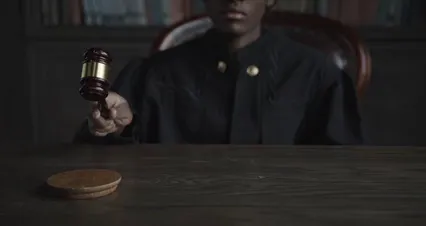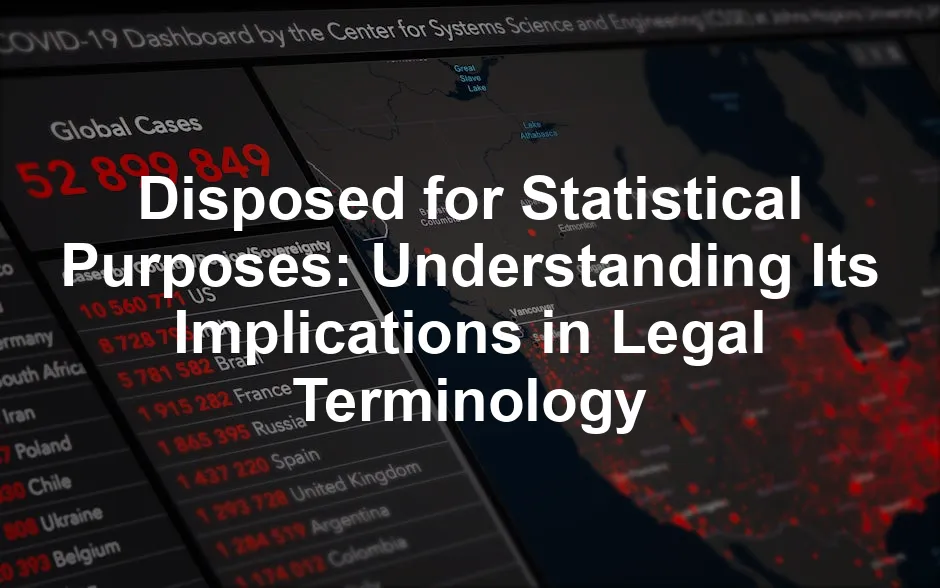Introduction
In the intricate maze of legal terminology, the phrase “disposed for statistical purposes” emerges as a key player, especially in court systems like Massachusetts. So, what does it mean? Essentially, it signals that a case has reached a resolution, albeit not necessarily through a traditional judgment. Instead, it serves a dual purpose: closing the case and contributing to the data pool that helps analyze court efficiency and case types.
Understanding this term is crucial for a variety of audiences. For legal professionals, it informs their strategies and assessments of case management. For individuals involved in legal matters, knowing this term can clarify their case’s status and potential implications. Even the general public benefits from grasping these concepts, as they demystify the often opaque legal processes.
Throughout this article, readers will gain insight into the nuances of “disposed for statistical purposes.” We’ll break down the definitions, explore different types of disposals, and discuss the implications of this classification. Real-world applications will also be featured, showcasing how this terminology impacts actual cases and informs legal practices. By the end of this discussion, you’ll be equipped with knowledge that enhances your understanding of legal terminologies and their ramifications in the judicial landscape.
And if you’re looking to build a solid foundation in legal terms, consider grabbing a comprehensive Legal Terminology Dictionary. It’s the perfect reference guide for anyone looking to decode the legal jargon.

Understanding Legal Terminology
What Does “Disposed” Mean?
In legal contexts, the term “disposed” signifies completion. It indicates that all necessary proceedings in a court case have concluded. However, the journey to disposal can take several paths. A case may be resolved through various outcomes: it could be dismissed, settled, or even ruled upon with a verdict.
When a case is marked as “disposed,” it doesn’t necessarily mean a verdict was reached. Sometimes, it simply reflects that the court has decided to close the case for administrative purposes. This is where the term “disposed for statistical purposes” comes into play. It highlights that while the case is closed, it remains part of a broader statistical analysis aimed at understanding court performance and case trends.
Understanding this term helps legal professionals, litigants, and the public alike navigate the complexities of case statuses. It sheds light on how cases are categorized, and why certain cases might not follow the traditional routes one might expect. Ultimately, being informed empowers all parties involved in the legal system, ensuring transparency and clarity in what can sometimes feel like a labyrinth of legal jargon.
If you’re keen to dive deeper into legal principles, check out “The Elements of Law” by William J. C. O’Connor. It’s a classic that lays the groundwork for understanding legal concepts.

Disposed for Statistical Purposes
Definition
“Disposed for statistical purposes” refers to the classification of a case as resolved without a definitive judgment. This designation plays a pivotal role in the data collection process for court systems. It helps legal entities, researchers, and policymakers analyze trends and assess the efficiency of the judicial system. Essentially, it means that although the case is closed, it doesn’t reflect a final ruling on the merits of the case.
This status is vital for courts to maintain an accurate record of activity. It allows for the aggregation of data, which can then be used to improve judicial processes. The term signifies that the court has handled the case, but it does not imply any wrongdoing or resolution in favor of any party.
Examples
Consider a scenario where a small claims case is brought to court. If the parties reach an agreement outside of court, the judge may categorize this case as “disposed for statistical purposes.” This means the case is no longer active, but it doesn’t provide insights into the specifics of the settlement. Another example could involve a case that was filed but never went to trial due to a lack of evidence or interest from the parties involved. Here, the case is also marked as disposed for statistical purposes, indicating closure without further legal implications.
Cases disposed for statistical purposes can include varied situations, such as those where parties withdraw their claims or where the court decides the case does not warrant a detailed ruling. This classification is particularly common in jurisdictions like Massachusetts, where the judicial system emphasizes data collection to inform future practices.
Understanding this status is crucial for anyone checking their legal matters. For instance, if a person finds their case marked as disposed for statistical purposes, they can ascertain that the case is closed but may still need to clarify its implications for their legal standing or financial future. This status provides a snapshot of court activity without diving into the complexities of each individual case.

For those looking to improve their legal writing skills, consider picking up “Legal Writing in Plain English” by Bryan A. Garner. It’s a fantastic resource for simplifying complex legal concepts.
Interlocutory Application Pending
Definition
An “interlocutory application pending” refers to a request made to the court while the main case is still active but has been marked as disposed. This means the court is considering a specific issue or request that doesn’t necessarily resolve the entire case. These applications can occur for various reasons, such as seeking additional evidence, requesting a stay on proceedings, or asking for clarification on specific legal points.
This status is essential because it indicates that even though the primary case has been closed for administrative purposes or statistical analysis, there are still ongoing legal considerations. It ensures that the court’s workload is accurately recorded while acknowledging that some aspects of the case may still require judicial attention.
In practical terms, an interlocutory application might arise if one party seeks to revisit a particular aspect of the case that remains unresolved, such as enforcing an order or addressing procedural issues. The outcome of such applications can significantly affect the parties involved, potentially leading to new hearings or further legal interpretations.

The Importance of Understanding Case Disposal
Statistical Analysis and Legal Insights
Understanding case disposal is vital for grasping how courts function. When cases are marked as disposed for statistical purposes, it directly affects statistical analysis, trends in legal proceedings, and overall court efficiency. Courts rely on this data to assess their performance and identify areas needing improvement. For instance, if a significant number of cases are disposed without a judgment, it may signal issues in the legal process that warrant attention.
Moreover, understanding this terminology can help demystify the legal process for laypeople. Many individuals experience anxiety when dealing with the courts. Knowing that a case is “disposed” doesn’t always mean it ended unfavorably can alleviate some of that stress. Instead, it can signify a systematic approach to managing case loads, giving the public a more transparent view of legal proceedings.
Real-world examples illustrate how “disposed for statistical purposes” impacts legal decisions and public perception. For instance, consider a small claims case where the plaintiff and defendant settle outside of court. The court may classify the case as “disposed for statistical purposes.” While this indicates closure, it doesn’t reveal the settlement’s details. This categorization can influence how similar cases are perceived in the future.
In another scenario, a case may be disposed for statistical reasons due to insufficient evidence. This doesn’t reflect poorly on either party but highlights the complexities of legal proceedings. When people see cases labeled this way, they can understand that the judicial system is not just about winning or losing but also about data-driven insights that guide future practices.

And if you want to enhance your understanding of business law, check out “Business Law: Text and Cases” by Kenneth W. Clarkson. It’s an excellent resource for both students and professionals looking to navigate the complexities of business law.
These examples highlight the importance of recognizing the implications of case statuses. They affect not only the individuals involved but also contribute to the broader understanding of the legal landscape. By grasping these concepts, individuals can navigate their legal journeys with greater confidence and clarity.

Legal Implications of Case Disposal
Can a Disposed Case Be Reopened?
A case marked as disposed for statistical purposes typically indicates closure without a final ruling. However, this does not mean it’s permanently sealed off from future scrutiny. Certain conditions could allow a disposed case to be reopened.
First, if new evidence surfaces, parties may petition the court to reconsider the case. This is especially relevant in criminal cases where the discovery of exculpatory evidence could drastically change the outcome.
Second, if a party believes the case was improperly disposed, they can seek to challenge that status. This could involve demonstrating procedural errors during the original proceedings. For instance, if a case was disposed while critical information was withheld, this might warrant reopening the case.
Lastly, if the case falls under specific legal provisions allowing for reconsideration, it may be revisited. Courts often have guidelines about reopening cases, and these vary by jurisdiction. Legal counsel can provide the necessary guidance on navigating these complex waters.

Effects on Credit Reports and Legal Records
When a case is disposed for statistical purposes, its impact on an individual’s financial landscape can be significant. For one, this status can appear on credit reports, potentially leading to confusion or misinterpretation by creditors.
Imagine applying for a mortgage and discovering your credit report shows a disposed case. Lenders might view this negatively, associating it with unresolved issues, even if that’s not the case. A report saying “disposed for statistical purposes” doesn’t indicate anything was paid or settled. It merely signifies the closure of the case without a definitive judgment.
In financial contexts, the implications can be more serious. A disposed case might not reflect that a debt was settled or that outstanding issues were resolved. This can complicate matters for individuals trying to secure loans or mortgages. Lenders often require clarity on an individual’s financial history. If they see a disposed case without context, it might raise red flags, leading to denial of credit or higher interest rates.

Those affected should proactively request documentation from the court reflecting the case’s status. This could serve as a useful tool in negotiations with creditors and financial institutions.
Legal Representation
Navigating the legal landscape surrounding disposed cases demands a skilled hand. Seeking legal representation is crucial when dealing with cases marked as disposed, especially for individuals wanting to contest or clarify their case status.
A seasoned attorney can help you understand the implications of your case’s status. They can decipher the legal jargon and provide insights into what it means for your situation. If you believe your case should be reopened or if you need clarification on its impact, having a lawyer by your side is invaluable.
Moreover, legal counsel can assist in drafting the necessary motions to reopen a case, ensuring that all procedural requirements are met. They can also provide guidance on presenting new evidence or correcting any misunderstandings about the case’s status.
In summary, legal representation is not just beneficial; it’s essential when dealing with disposed cases. The complexities of the legal system can be daunting, but with the right support, individuals can navigate these challenges successfully.

FAQs
What does “disposed for statistical purposes” mean in layman’s terms?
In simple terms, it means the case is closed without a final judgment. It’s like saying, “We’re done here,” but without deciding who won or lost. This classification helps courts track how many cases they handle and assess their efficiency.
Can a case marked as disposed be reopened?
Yes, under certain conditions. If new evidence comes to light or there’s a belief that the case was wrongly disposed, parties can petition the court. However, this process can be complex and often requires legal assistance.
How does case disposal affect my credit report?
A case marked as disposed for statistical purposes might appear on your credit report. However, it does not indicate that any debt was paid or resolved. This can lead to confusion with creditors, potentially impacting your ability to secure loans or credit.
What should I do if my case status is disposed but I believe it was resolved incorrectly?
If you feel your case was not disposed of properly, the first step is to contact a lawyer. They can help you understand your options, including the possibility of reopening the case or addressing any misunderstandings with the court.
Are there any resources for understanding legal terms better?
Absolutely! Websites like Nolo.com and legal dictionaries can be great starting points. Additionally, many local law schools offer free legal clinics or workshops focused on educating the public about common legal issues and terminology.
Please let us know what you think about our content by leaving a comment down below!
Thank you for reading till here 🙂
For those interested in a deeper understanding of statistical concepts, you might find an introduction to statistical learning with python book length valuable.
And while you’re at it, why not organize your legal documents in style? A Legal Briefcase can keep all your important files in one place, making you look extra professional during those court visits!
For those intense late-night study sessions, consider a pair of noise-canceling headphones to drown out distractions. Trust me, your brain will thank you!
All images from Pexels




